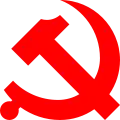Central Leading Group on Hong Kong and Macau Affairs
The Central Leading Group on Hong Kong and Macau Affairs (Chinese: 中央港澳工作领导小组; pinyin: Zhōngyāng Gǎng Ao Gōngzuò Lǐngdǎo Xiǎozǔ) is an internal policy coordination group of the Central Committee of the Communist Party of China and the State Council of the People's Republic of China, reporting to the Politburo, in charge of supervising and coordinating Beijing's policy towards the Special Administrative Regions of Hong Kong and Macau. The Group is the highest de facto body for China's policy towards Hong Kong and Macau.
 | |
| Formation | August 1978 |
|---|---|
| Type | Policy coordination and consultation body |
| Location |
|
Leader | Han Zheng[1] |
Deputy Leaders | Sun Chunlan Yang Jiechi You Quan |
Hong Kong and Macau Affairs Office Chief | Xia Baolong |
Parent organisation | Central Committee of the Communist Party of China |
| Subsidiaries | Hong Kong and Macau Affairs Office |
.svg.png.webp) |
|---|
| This article is part of a series on the politics and government of China |
|
|
| Central Leading Group on Hong Kong and Macau Affairs | |||||||||||
|---|---|---|---|---|---|---|---|---|---|---|---|
| Simplified Chinese | 中央港澳工作领导小组 | ||||||||||
| Traditional Chinese | 中央港澳工作領導小組 | ||||||||||
| |||||||||||
The General Office for the group is also known as the Hong Kong and Macau Affairs Office.
History
The Group was established as the Central Coordination Group for Hong Kong and Macau Affairs on 17 August 1978 though an informal Hong Kong-Macau affairs group had formed much earlier.[2] Its founding memo described the group's aim as "seek truth from facts, approach things appropriately according to the situation, do not assume what works in the mainland will work elsewhere, be flexible."
In order to deal with increasingly serious July 1 marches in Hong Kong in 2003, then Politburo Standing Committee (PSC) member and Vice President Zeng Qinghong became leader of the group that year, and China's policy towards the SARs underwent significant reforms. Most notably, the group enacted the Mainland and Hong Kong Closer Economic Partnership Arrangement (CEPA) and the Mainland and Macau Closer Economic Partnership Arrangement, preferential trade agreements, and the Individual Visit Scheme, which allowed mainlanders to visit Hong Kong and Macau on an individual basis without having to apply for group visas or go through officially approved tour groups. Since 2003, the group has always been led by a member of the PSC.
In 2020, in the context of the 2019–20 Hong Kong protests, the group was upgraded from a Central Coordination Group to a Central Leading Group.[3]
List of Leaders
- Zeng Qinghong (2003–2007)
- Xi Jinping (2007–2012)
- Zhang Dejiang (2012–2018)
- Han Zheng (2018–present)
Current composition
- Leader
- Deputy Leaders
- Sun Chunlan, Politburo, Vice-Premier of the State Council
- Yang Jiechi, Politburo, Director of the Central Foreign Affairs Commission Office
- You Quan, Head of the United Front Work Department of the CPC Central Committee
- Zhao Kezhi, Minister of Public Security
- Members
- Xia Baolong, Director of the Hong Kong and Macau Affairs Office
- Luo Huining, Director of the Central Government Liaison Office in Hong Kong
- Fu Ziying, Director of the Central Government Liaison Office in Macau
References
- Pomfret, James; Torode, Greg (August 30, 2019). "Exclusive: Amid crisis, China rejected Hong Kong plan to appease protesters - sources". Reuters. Archived from the original on 31 August 2019. Retrieved 31 August 2019.
- "1978年8月12日 中央决定成立港澳小组". People's Daily. Archived from the original on 2014-07-14. Retrieved 2014-12-28.
- "National security law: Hong Kong delegates to NPC say US retaliatory measures will not weaken Beijing's resolve". South China Morning Post. 29 May 2020. Retrieved 30 May 2020.
